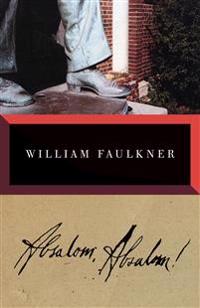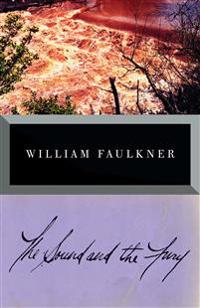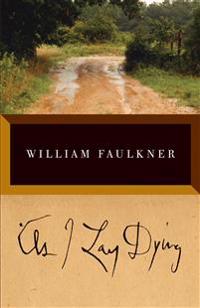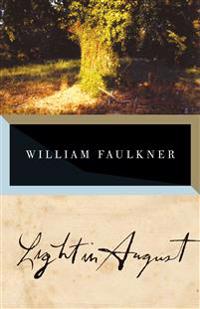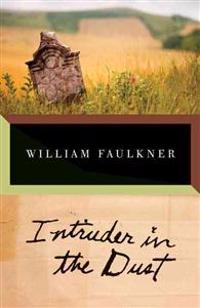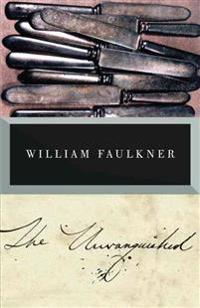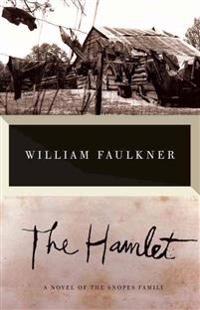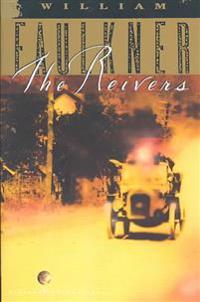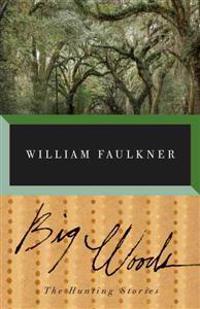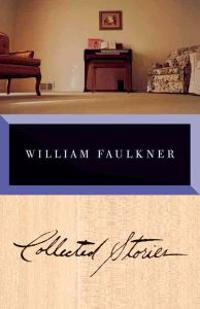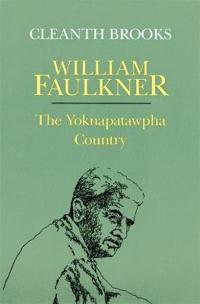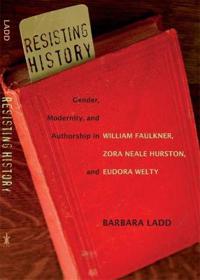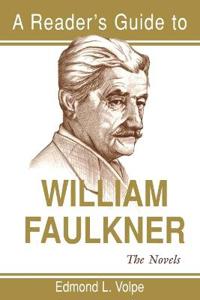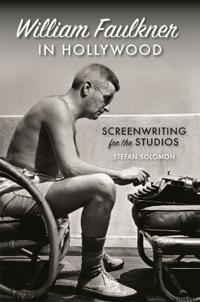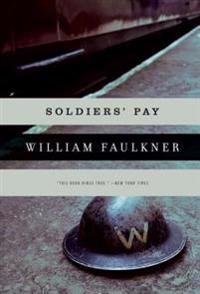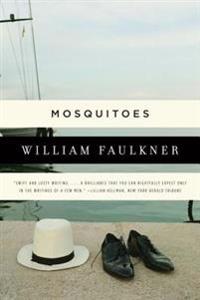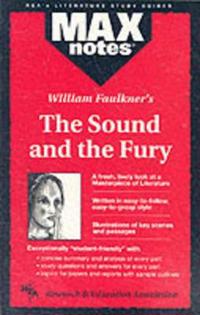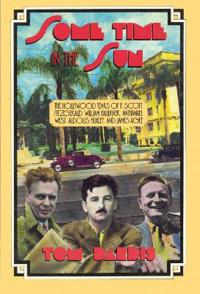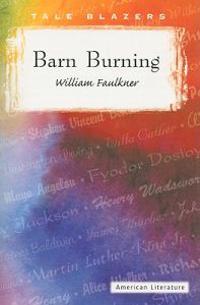Absalom, Absalom!: The Corrected Text (Häftad)
avWilliam Faulkner
ISBN: 9780679732181 - UTGIVEN: 199101The story of Thomas Sutpen, an enigmatic stranger who came to Jefferson in the early 1830s to wrest his mansion out of the muddy bottoms of the north Mississippi wilderness. He was a man, Faulkner said, "who wanted sons and the sons destroyed him."[...]
The Sound and the Fury: The Corrected Text (Häftad)
avWilliam Faulkner
ISBN: 9780679732242 - UTGIVEN: 199101First published in 1929, Faulkner created his "heart's darling," the beautiful and tragic Caddy Compson, whose story Faulkner told through separate monologues by her three brothers--the idiot Benjy, the neurotic suicidal Quentin and the monstrous Jason.[...]
As I Lay Dying (Häftad)
avWilliam Faulkner
ISBN: 9780679732259 - UTGIVEN: 199101"I set out deliberately to write a tour-de-force. Before I ever put pen to paper and set down the first word I knew what the last word would be and almost where the last period would fall." --William Faulkner on "As I Lay Dying"
"As I Lay Dying" is Faulkner's harrowing account of the Bundren fam[...]Light in August (Pocket)
avWilliam Faulkner
ISBN: 9780679732266 - UTGIVEN: 199101Joe Christmas does not know whether he is black or white. Faulkner makes of Joe's tragedy a powerful indictment of racism; at the same time Joe's life is a study of the divided self and becomes a symbol of 20th century man.[...]
Intruder in the Dust (Häftad)
avWilliam Faulkner
ISBN: 9780679736516 - UTGIVEN: 199110A classic Faulkner novel which explores the lives of a family of characters in the South. An aging black who has long refused to adopt the black's traditionally servile attitude is wrongfully accused of murdering a white woman.[...]
The Unvanquished (Pocket)
avWilliam Faulkner
ISBN: 9780679736523 - UTGIVEN: 199110Set in Mississippi during the Civil War and Reconstruction, THE UNVANQUISHED focuses on the Sartoris family, who, with their code of personal responsibility and courage, stand for the best of the Old South's traditions.[...]
The Hamlet (Pocket)
avWilliam Faulkner
ISBN: 9780679736530 - UTGIVEN: 199110The Hamlet, the first novel of Faulkner's Snopes trilogy, is both an ironic take on classical tragedy and a mordant commentary on the grand pretensions of the antebellum South and the depths of its decay in the aftermath of war and Reconstruction. It tells of the advent and the rise of the Snopes fa[...]
Big Woods (Häftad)
avWilliam Faulkner
ISBN: 9780679752523 - UTGIVEN: 1994-04"The Bear, " "The Old People, " "A Bear Hunt, " "Race at Morning"--some of Nobel Prize-winning author William Faulkner's most famous stories are collected in this volume--in which he observed, celebrated, and mourned the fragile otherness that is nature, as well as the cruelty and humanity of men. "[...]
Collected Stories (Häftad)
avWilliam Faulkner
ISBN: 9780679764038 - UTGIVEN: 199510This magisterial collection of short works by Nobel Prize-winning author William Faulkner reminds readers of his ability to compress his epic vision into narratives as hard and wounding as bullets. Among the 42 selections in this book are such classics as "A Bear Hunt, " "A Rose for Emily, " Two Sol[...]
William Faulkner: An Economy of Complex Words (Övrig)
avRichard Godden
ISBN: 9780691130712 - UTGIVEN: 2007-07-16In "William Faulkner", Richard Godden traces how the novelist's late fiction echoes the economic and racial traumas of the South's delayed modernization in the mid-twentieth century. As the New Deal rapidly accelerated the long-term shift from tenant farming to modern agriculture, many African Ameri[...]
Family Dysfunction in William Faulkner's as I Lay Dying (Häftad)
ISBN: 9780737763867 - UTGIVEN: 2013-04William Faulkner: The Yoknapatawpha Country (Häftad)
avCleanth Brooks
ISBN: 9780807116012 - UTGIVEN: 199002An examination of the Yoknapatawpha novels, in themselves and in their relationship with Faulkner's central accomplishment, sheds light on Faulkner's development, technique, themes, and concerns[...]
Resisting History: Gender, Modernity, and Authorship in William Faulkner, Zora Neale Hurston, and Eudora Welty (häftad)
ISBN: 9780807143698 - UTGIVEN: 2012-01In a major reinterpretation, Resisting History reveals that women, as subjects of writing and as writing subjects themselves, played a far more important role in shaping the landscape of modernism than has been previously acknowledged. Here Barbara Ladd offers powerful new readings of three southern[...]
A Reader's Guide to William Faulkner
ISBN: 9780815630012 - UTGIVEN: 2003-02A standard reference work for forty years, this work is the most complete and detailed guide to the novels of William Faulkner. Unlike other treatments of Faulkner, this volume is designed specifically as a guide to critical interpretation and to promote an appreciation of Faulkner's novels. Edmond [...]
A Reader's Guide to William Faulkner
ISBN: 9780815630470 - UTGIVEN: 2004-05The new guide - the first comprehensive book of its kind - offers analyses of all Faulkner's short stories, published and unpublished, that were not incorporated into novels or turned into chapters of a novel. Seventy-one stories receive individual critical analysis and evaluation. These discussions[...]
William Faulkner in Hollywood
ISBN: 9780820351131 - UTGIVEN: 2017-08During more than two decades (1932-1954), William Faulkner worked on approximately fifty screenplays for studios, including MGM, 20th Century-Fox, and Warner Bros., and was credited on such classic films as The Big Sleep and To Have and Have Not. The scripts that Faulkner wrote for film-and, later o[...]
William Faulkner
ISBN: 9780870136122 - UTGIVEN: 2002-10This collection brings together literary criticism on Faulkner detailing the imaginative and passionate responses to his still controversial novels. By focusing on the criticism rather than the works it shows the primary directions in Faulkner's influence on critics, writers and students.[...]
Soldiers' Pay (Häftad)
avWilliam Faulkner
ISBN: 9780871403100 - UTGIVEN: 2011-08Faulkner s first novel, Soldiers Pay (1926), is among the most memorable works to emerge from the First World War. Through the story of a wounded veteran s homecoming, it examines the impact of soldiers return from war on the people particularly the women who were left behind."[...]
Mosquitoes (Pocket)
avWilliam Faulkner
ISBN: 9780871403117 - UTGIVEN: 201108A delightful surprise, Faulkner s second novel introduces us to a colorful band of passengers on a boating excursion from New Orleans. This engaging, high-spirited novel which Faulkner wrote for the sake of writing because it was fun offers a fascinating glimpse of Faulkner as a young artist.[...]
William Faulkner's the Sound and the Fury
ISBN: 9780878910472 - UTGIVEN: 1996-04REA's MAXnotes for William Faulkner's The Sound and the Fury MAXnotes offer a fresh look at masterpieces of literature, presented in a lively and interesting fashion. Written by literary experts who currently teach the subject, MAXnotes will enhance your understanding and enjoyment of the work. MAXn[...]
Some Time in the Sun: Theagollywood Years of F. Scott Fitzgerald, William Faulkner, Nathanael West, Aldous Huxley and J AG (Häftad)
avTom Dardis
ISBN: 9780879101169 - UTGIVEN: 200408

